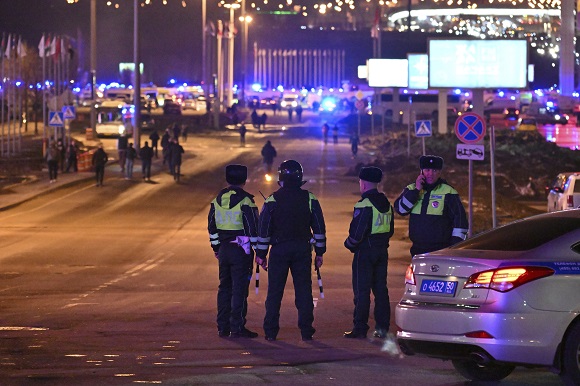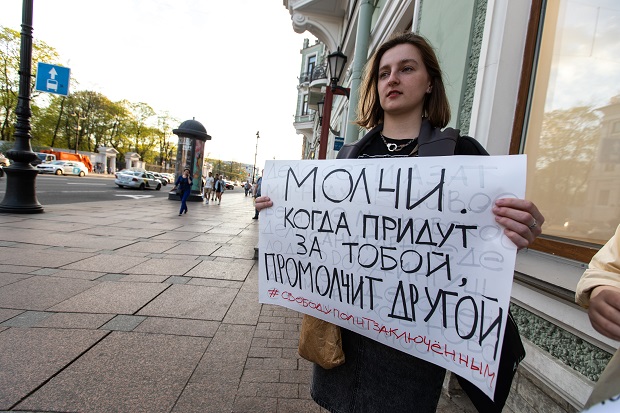world news online news
By Laura King
Los Angeles Times
(Los Angeles Times) Did Russian President Vladimir Putin overplay his hand? online news
Only five days after Putin breezed to another six-year term in power following a heavily stage-managed election, Russia suffered its deadliest terrorist attack in decades. At least 140 people died when attackers stormed Crocus City Hall, a shopping and entertainment complex on Moscow’s northwestern edge, first raking concertgoers with gunfire and then setting the venue ablaze.
Putin’s near-immediate response to Friday’s attack was to blame Ukraine, the neighboring sovereign country he has spent the last two years trying to subdue militarily. The government of Ukrainian President Volodymyr Zelensky has vehemently denied any involvement in the attack.
On the face of it, analysts say, Putin’s accusation against Ukraine makes no sense.
The Islamist group ISIS-K, an offshoot of Islamic State, quickly claimed responsibility, and even proffered self-shot video of the attack as proof. U.S. intelligence officials had publicly and privately warned that such an attack inside Russia by Islamist militants — who have targeted the country Russia over decades — was in the works, though its assessment of imminent danger was made a few weeks before the actual strike. Putin publicly dismissed the warnings as attempts to intimidate Russia.
Putin’s apparatus has pivoted in recent days to grudging acknowledgment that the likely culprits had an agenda unrelated to Ukraine: revenge for years of carnage carried out by Russian security forces in Syria, Chechnya and other Muslim states.
After the attack, Russia’s Federal Security Service, or FSB, reported the arrests of 11 people. The four suspected gunmen, who have been identified as Tajik nationals, were brought into court over the weekend on terrorism charges, appearing battered and brutalized. One appeared to be drifting in and out of consciousness.
But the Russian leader and his senior lieutenants have continued to insist that Ukraine played some role in the attack — and have widened the scope of the accusation to include Ukraine’s Western backers.
world news online news
The FSB head, Alexander Bortnikov, said Tuesday that investigators believed that while “radical Islamists” carried out the actual attack, “Western special services assisted, and Ukrainian special services played a direct role.” Bortnikov cited no evidence to support the assertion.
Bortnikov sought to cast suspicion on two of Ukraine’s staunchest allies, Britain and the United States. “We think that’s the case,” he said Tuesday when Russian reporters asked whether Washington and London had aided the attackers.

Britain’s foreign secretary, David Cameron, called the accusation “utter nonsense,” while State Department spokesman Matthew Miller said the claim was “simply not true.” U.S. officials reiterated the contention that the Islamic State offshoot was solely responsible.
William Courtney, a former U.S. ambassador to the former Soviet republics of Kazakhstan and Georgia, said the whole scenario amounted to a major blunder on the part of the 71-year-old Russian leader.
“I think this is a huge propaganda misstep, to somehow lay it off on Ukraine,” said Courtney, an adjunct senior fellow with the Rand Corp., a nonpartisan think tank.
Putin, he said, “may have calculated that the embarrassment of not having prevented the attack is lessened because it is cast as a big Western effort, not just from tiny Tajikistan.” But Courtney called it “a lie that was just too bold.”
Even overt fabulism, though, is sometimes carefully calibrated. Courtney and others also noted a hallmark of Stalinist-style strongmen: to turn a particularly audacious falsehood — the so-called Big Lie — into a blunt-force assertion of power, daring anyone to question what their own eyes and ears tell them.
A key element of Putin’s political brand over nearly a quarter-century in power has been his perceived ability to keep Russia safe, and the concert hall attack undercuts that notion.
world news online news
The florid accusations against Ukraine and the West — combined with authorities’ public flaunting of ferocious retaliation such as cutting off part of one suspect’s ear — are probably calculated to divert attention from intelligence lapses that led to the attack, longtime Russia watchers said.
“On the whole, Russia’s response to terrorism in the Putin years has been almost performatively brutal,” analyst and journalist Edward Lucas wrote in an online article for the Center for European Policy Analysis. But he added that the seeming ease with which the attackers struck served to “dent the FSB’s credibility at all levels.”
The Crocus City Hall attack pointed up another uneasy truth: Enormous security resources in Russia are devoted to shutting down all forms of domestic dissent. A muted but determined public outpouring after the death in an Arctic prison last month of Alexei Navalny, Putin’s fiercest and most vocal critic, was a reminder of continuing opposition to the Russian leader’s rule.
With independent media voices silenced and civil society groups disbanded or driven into exile, any breath of criticism against Putin’s government on virtually any subject — advocating for LGBTQ+ rights, for example — is branded as terrorist activity.
The harshness with which the suspects in the Moscow attack are being dealt with is another way for Putin to signal that challenges from within or without will not go unanswered.
The ugly aftermath of the concert hall attack is also entwined with the even uglier dynamics of the Ukraine war.
world news online news
Russia, which has lately regained battlefield momentum after a string of early failures, has been battering the Ukrainian capital, Kyiv, and other cities with the most punishing drone and missile attacks in months. The renewed ferocity of attacks against civilian areas probably would have occurred anyway, analysts say, but Putin can use the concert hall strike as a pretext for stepped-up bombardment.
Zelensky has sought to draw attention to lagging support from allies, particularly the United States, where congressional Republicans have blocked assistance and weaponry. Delays are deadly, the Ukrainian leader said.
“Ukraine needs more air defense,” Zelensky said. “This is security for our cities, and saves human lives.”
As the war drags on, Putin will need to mobilize more and more troops — something he has managed to do so far, but the conflict’s ripple effects are being felt more widely across Russian society.
In one small but telling example, Kremlin spokesman Dmitry Peskov last week acknowledged for the first time that Russia’s actions in Ukraine constituted a “war.”
That might have been obvious for some time to the rest of the world, but in the wake of the full-scale invasion on Feb. 24, 2022, Putin’s government confined itself to the term “special military operation.”
That term still applies, Peskov told reporters, but he denounced the involvement of the “collective West” as a continuing escalation and provocation.
“De facto, it has become a war for us,” he said.
©2024 Los Angeles Times. Visit at latimes.com. Distributed by Tribune Content Agency, LLC.
world news online news
Notes from APS Radio News
During Syria’s civil war over ten years ago, not only was the government in that country accusing the US, Great Britain and Qatar of supporting militant religious groups.
But media platforms like The Guardian were as well.
During the early months of the civil war, in 2011, Mark Toner, then US State Department spokesperson, acknowledged that the US had been sending millions of dollars to rebels in Syria.
About 600, 000 died during the years of conflict.
Concerning the Taliban and Mujahedeen in Afghanistan decades ago, reports surfaced that the CIA had been funding those groups through Pakistan’s intelligency agency, ISI.
Jean Charles Brisard, the author of Forbidden Truth, outlined some of that history.
According to the author, during the summer of 2001, representatives of the Bush administration and Unocal were negotiating with Taliban officials for the construction of a pipeline.
Also according to Mr. Brisard, those negotiations came to grief, eventually resulting in a falling out between the parties.
During and after Libya’s civil war, which, as was true of Syria’s civil war, started in 2011, there were reports that Benghazi was being used as an entropot for the shipment of arms to Syria.


